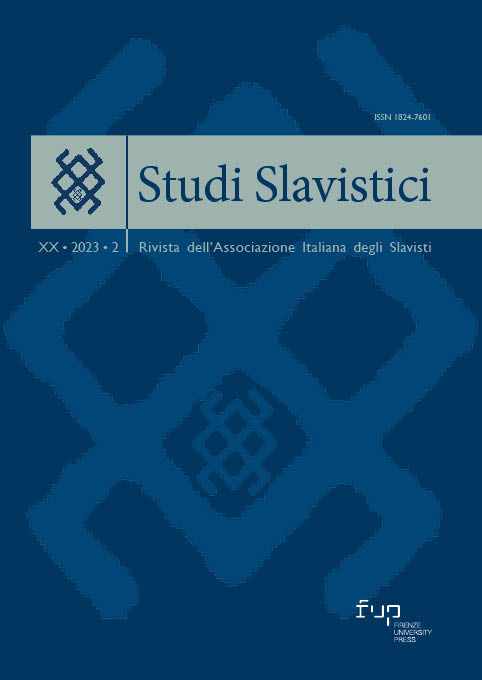Between Comparative and Postcolonial Studies: the Past and Future of Italian Approaches to East Slavic Literary Intersections
Published 2024-01-29
Keywords
- Italian Slavic Studies,
- Belarusian Literature,
- Russian Literature,
- Ukrainian Literature,
- Comparative Literature
- Postcolonial Studies ...More
Copyright (c) 2024 Alessandro Achilli

This work is licensed under a Creative Commons Attribution 4.0 International License.
Abstract
This contribution reflects on the state of comparative studies devoted to East Slavic literatures in Italy. Between the end of the 20th and beginning of the 21st century, Italian scholars of Slavic studies and the editors of Italian journals have made a number of interesting proposals on the subject. However, hyper-specialization has often hampered efforts to put theory into practice. I foreground some of these important methodological contributions by Italian scholars on comparative Slavic studies and discuss them both in the international context and with reference to other methodologies and research fields, most notably postcolonial studies. After the full-scale invasion of Ukraine by the Russian Federation in February 2022, comparative studies at the crossroads of Belarusian, Russian, and Ukrainian cultures have become a thorny issue. Scholars should seek to strike a balance between a philological approach and the ethical need to respect the different cultural orientations of East Slavic nations.
References
- Achilli et al. 2021: A. Achilli, O. Pachlovska, L. Quercioli Mincer, La Belarus’ fra passato e presente, nation building e molteplicità culturale. Prefazione dei curatori, “Ricerche slavistiche. Nuova serie”, lxiv, 2021, 4, pp. 9-24.
- Achilli, Puleri 2022a: A. Achilli, M. Puleri, Da marginali a classici di oggi: le “letterature minori” dell’area slava orientale nel panorama editoriale italiano, in: M. Bradaš, T. D’Amico, C. Diddi (a cura di), Diacritici in copertina. Le letterature dell’Europa centro- e sud-orientale tra strategie editoriali e traduzione, Salerno 2022, pp. 31-42.
- Achilli, Puleri 2022b: A. Achilli, M. Puleri, Beyond War: Russia, Ukraine and the State of the Field, “eSamizdat”, xv, 2022, pp. 19-24.
- Achilli, Grusha Possamai 2022: A. Achilli, Y. Grusha Possamai (a cura di), Poeti d’Ucraina, Milano 2022.
- Albertazzi, Possamai 2002: S. Albertazzi, D. Possamai (eds.), Postmodernism and Postcolonialism, Padova 2002.
- Albertazzi et al. 2005: S. Albertazzi, G. Imposti, D. Possamai (a cura di), Post-scripta: incontri possibili e impossibili tra culture. Atti del Convegno Internazionale, Bologna, 13-15 novembre 2003, Padova 2005.
- Brogi Bercoff 1996: G. Brogi Bercoff, Zum literarischen Gebrauch der Mischsprache im ostslavischen Bereich im 17.-18. Jh., “Ricerche slavistiche”, xliii, 1996, pp. 183-208.
- Brogi Bercoff 2005: G. Brogi Bercoff, La lingua letteraria in Ucraina ieri e oggi, “Studi Slavistici”, ii, 2005, pp. 119-136.
- Brogi Bercoff 2013: G. Brogi Bercoff, Constructing Canons: Ruthenian Literatures of the 17th-18th Centuries in Plurilingual Context, in: M. Garzaniti, A. Alberti, M. Perotto, B. Sulpasso (a cura di), Contributi italiani al xv Congresso Internazionale degli Slavisti, Firenze 2013, pp. 251-274.
- Garzaniti 2023: M. Garzaniti, Storia delle letterature slave. Libri, scrittori e idee dall’Adriatico alla Siberia (secoli ix-xxi), Roma 2023.
- Grabowicz 1992: G. G. Grabowicz, Ukrainian-Russian Literary Relations in the Nineteenth Century: A Formulation of the Problem, in: P.J. Potichnyj, M. Raeff, J. Pelenski, G.N. Žekulin (eds.), Ukraine and Russia in Their Historic Encounter, Edmonton 1992, pp. 214-244.
- Graciotti 1994: S. Graciotti, Comparatistica letteraria slava, in G. Brogi Bercoff, G. Dell’Agata, P. Marchesani, R. Picchio (a cura di), La slavistica in Italia: Cinquant’anni di studi (1940–1990), Roma 1994, pp. 89-118.
- Grusha Possamai 2022: Y. Grusha Possamai (a cura di), Dimensione Kyiv: Viaggio letterario in una città ferita nelle voci di classici e contemporanei. Milano 2022.
- Johnson 2023: J. Johnson (Pres.), Association for Slavic, East European, and Eurasian Studies, 2023 aseees Convention Theme, <https://www.aseees.org/convention/2023-aseees-convention-theme> (ultimo accesso: 05.10.23).
- Kirschbaum 2016: H. Kirschbaum, Im intertextuellen Schlangennest. Adam Mickiewicz und polnisch-russisches (anti‑)imperiales Schreiben, Frankfurt a.M. 2016.
- Koplatadze 2019: T. Koplatadze, Theorising Russian Postcolonial Studies, “Postcolonial Studies”, xxii, 2019, pp. 469-489.
- Ljuckanov 2014: J. Ljuckanov, Toward Paired Histories of Small Literatures, To Make Them Communicate, “Studi Slavistici”, xi, 2014, pp. 285-300.
- Magocsi 2002: P. Magocsi, The Roots of Ukrainian Nationalism: Galicia as Ukraine’s Piedmont. Toronto-London-Buffalo 2002.
- Moracci 2005: G. Moracci (a cura di), Prospettive di comparatistica nello studio delle letterature slave, “Studi Slavistici”, ii, 2005, pp. 256-289.
- Pala 2018: M. Pala, Sinergie della crisi: un’ipotesi sulla letteratura comparata e il pensiero postcoloniale, “Ermeneutica letteraria”, xiv, 2018, pp. 37-47.
- Yermolenko et. al. 2023: V. Yermolenko et. al., We Respond to Our People: pen Ukraine Executive Board Statement Regarding Common Events with Russian Participants, <https://pen.org.ua/en/my-vidpovidayemo-pered-svoyim-narodom-zayava-vykonavchoyi-rady-ukrayinskoho-pen-scshodo-spilnykh-podij-z-rosijskymy-uchasnykamy> (ultimo accesso: 05.10.23).
- Possamai 2008: D. Possamai, “Uno scrittore è scrittore là dove viene letto…”: il caso Kurkov, in: M. Di Salvo, G. Moracci, G. Siedina (a cura di), Nel mondo degli slavi. Incontri e dialoghi tra culture. Studi in onore di Giovanna Brogi Bercoff, Firenze 2008, pp. 459-468.
- Puleri 2016: M. Puleri, Narrazioni ibride postsovietiche. Per una letteratura ucraina di lingua russa, Firenze 2016.
- Puleri 2020: M. Puleri, Ukrainian, Russophone, (Other) Russian: Hybrid Identities and Narratives in Post-Soviet Culture and Politics. Berlin 2020.
- Puleri 2021: M. Puleri, Ripensare il post-sovietico. Un’introduzione, “eSamizdat”, xiv, 2021, pp. 7-17.
- Sapiro 2011: G. Sapiro, Comparativism, Transfers, Entangled History: Sociological Perspectives on Literature, in: A. Behdad, D. Thomas (eds.), Companion to Comparative Literature, Malden 2011, pp. 225-236.


